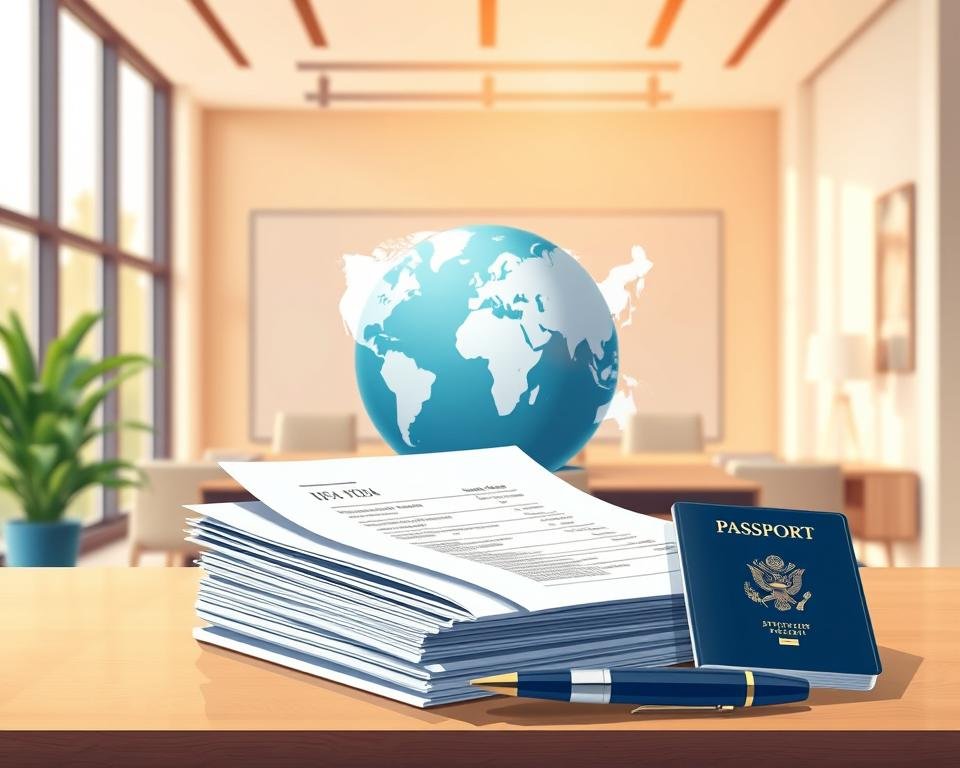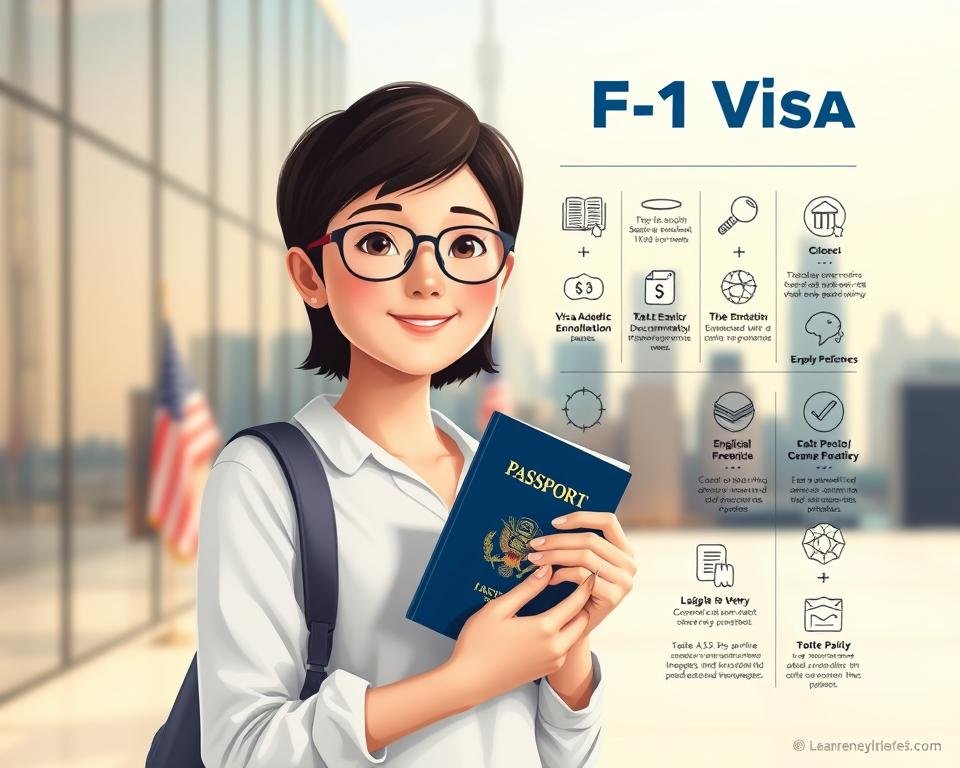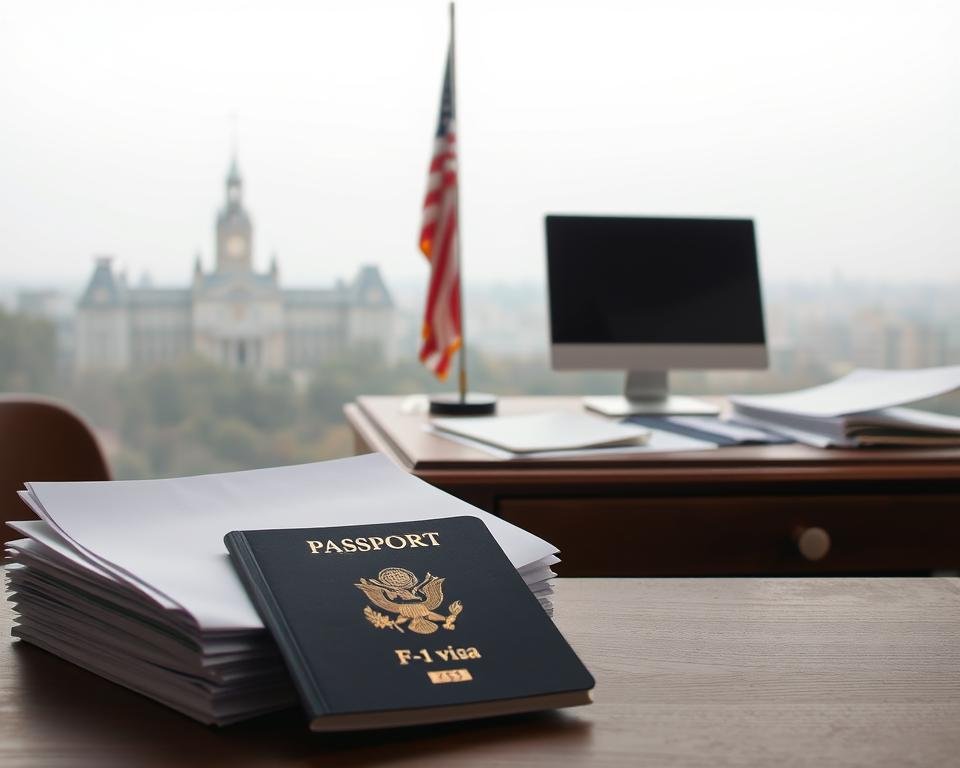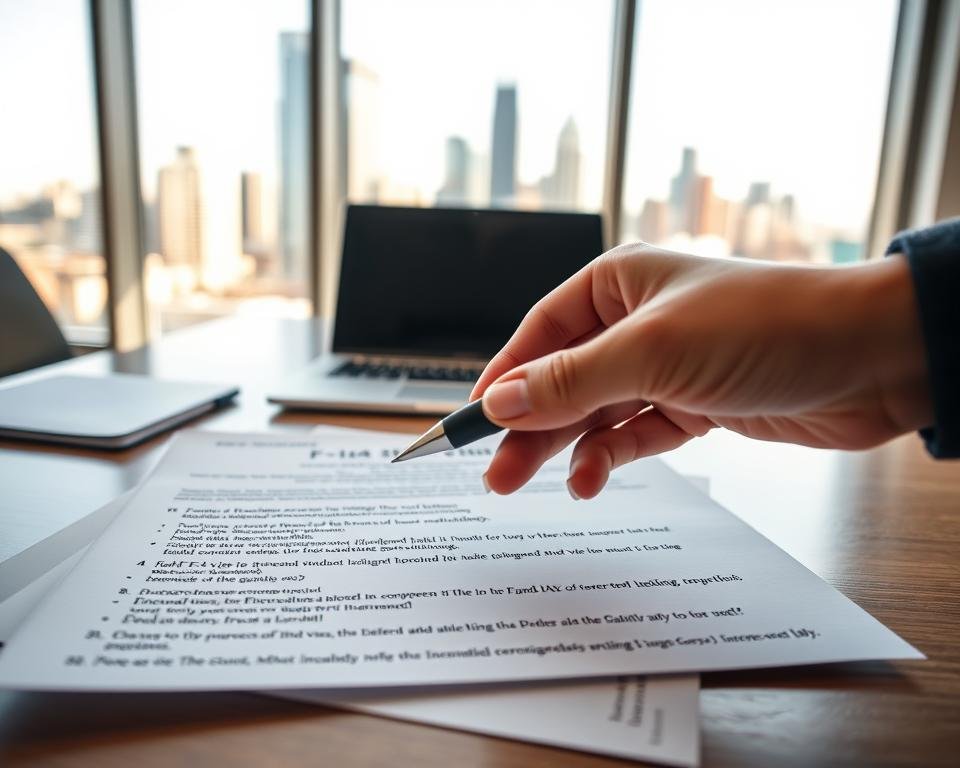Student visa help 2025: usa student visa requirements (f-1 visa)

"Education is the most powerful weapon which you can use to change the world." - Nelson Mandela. This quote is very meaningful for international students dreaming of studying in the United States.
Understanding the USA student visa requirements, like the F-1 visa, is key for those wanting to study abroad. As we approach 2025, knowing the details of the international student visa process is vital. The F-1 visa lets international students dive into the U.S.'s lively educational scene. But, it also has its own rules and needs.
If you're looking for help with your student visa or are ready to start your studies, this guide has got you covered. It will tell you all you need to know about getting your F-1 visa. This way, you'll be ready for this exciting new chapter.
- Understanding F-1 Visa Overview
- USA Student Visa Requirements (F-1 Visa)
- Eligibility Criteria for F-1 Visa
- Visa Application Process for F-1 Visa
- Necessary Documents for USA Student Visa Application
- Financial Requirements for F-1 Visa
- Preparing for the F-1 Visa Interview
- Maintaining F-1 Visa Status
- Common Challenges Faced by F-1 Visa Students
- Impact of Changes in U.S. Immigration Policy on F-1 Visa Students
- Success Stories of F-1 Visa Holders
- Future Prospects for F-1 Visa Students in the United States
- Resources for Additional Student Visa Help
Understanding F-1 Visa Overview
The F-1 visa is a key way for international students to study in the United States. It's for those who are full-time students at accredited schools. This visa lets students dive into a rich educational environment while following certain rules.
One of the perks of the F-1 visa is the chance to work in some jobs. These jobs must be on campus or related to your study field. Students must always follow their visa's rules, like staying enrolled and working within allowed limits.
It's important for students to know the challenges of the F-1 visa. There have been cases where the U.S. Department of Homeland Security revoked visas. This has put students at risk of detention or deportation. Those affected can file a lawsuit to reinstate their visa, showing the need for awareness and action to protect their studies.

USA Student Visa Requirements (F-1 Visa)
To get an F-1 visa, you must meet certain requirements. First, you need to show you have enough money for school and living costs. You also need a valid passport and proof of admission from a recognized school.
The Form I-20 is key for your F-1 visa. It shows you're eligible to study in the U.S. It lists your study plan and how long you'll stay. Keeping this document safe is important for your legal status.
Not following U.S. immigration laws can lead to serious problems. For example, Arizona State University has seen many visa revocations. Always carry your immigration papers, like your I-94 record, with you. For more information, read this article about visa compliance.
Before applying for an F-1 visa, know all the requirements. Not meeting these can cause issues. It's wise to prepare well to avoid mistakes. Check out this guide for tips on your visa application.

Eligibility Criteria for F-1 Visa
Understanding the F-1 visa eligibility criteria is key for international students wanting to study in the United States. To qualify, students must meet certain academic and enrollment requirements. These rules help ensure students are well-prepared and supported during their studies.
Academic Requirements for International Students
International students need to meet several academic requirements for an F-1 visa. Undergraduate students must take at least 12 credit hours. Graduate students need to take a similar number of courses. Students also must show they are doing well in their studies to keep their F-1 status.
Knowing these academic requirements for international students is important for a good academic experience.
Enrollment in an Accredited Institution
Being enrolled in an accredited institution is a big part of the F-1 visa criteria. Students must get into a program at a U.S. school that's certified by the Student and Exchange Visitor Program (SEVP). This makes sure the education is recognized and valued.

Visa Application Process for F-1 Visa
Applying for the F-1 visa is a detailed process that needs careful planning. Starting early can make the application smoother. Knowing what documents you need helps avoid missing anything important.
Step-by-Step Guide to Applying for F-1 Visa
The F-1 visa application has several important steps:
- Receive Form I-20: Get the Form I-20 from your school to show you're enrolled.
- Complete DS-160: Fill out the online visa application form (DS-160) correctly.
- Pay the SEVIS fee: This fee is required and must be paid before your visa interview.
- Schedule Visa Interview: Book an interview at the U.S. embassy or consulate nearest you.
- Compile Documentation: Collect all needed documents for the interview, like proof of money and acceptance.
Important Timelines to Consider
Following a timeline is key for a successful F-1 visa application. Here's a basic timeline to keep in mind:
| Activity | Recommended Timeline |
|---|---|
| Receive Form I-20 | 3-6 months before start date |
| Complete DS-160 | 3-5 months before start date |
| Pay SEVIS Fee | 3-4 months before start date |
| Schedule Visa Interview | 2-3 months before start date |
| Attend Visa Interview | 1-2 months before start date |
Necessary Documents for USA Student Visa Application
Getting an F-1 visa needs careful preparation of USA student visa documents. Students must gather essential visa application documents. These documents prove they can study in the United States.
- Valid Passport: Must be valid for at least six months beyond the intended stay.
- Form I-20: Issued by the educational institution, this form confirms acceptance to a program.
- Proof of Financial Resources: Documentation showing you can pay for tuition and living costs.
- Academic Transcripts: Records from previous schools, relevant to your studies.
- Ties to Home Country: Evidence showing you plan to return, like family ties or property.
- Passport-sized Photographs: Recent photos that meet specific requirements.
- DS-160 Confirmation Page: Completed online visa application form confirmation.
Each item is key to the application. Missing or wrong USA student visa documents can cause delays or visa denial. It's important to prepare all visa application documents carefully. This ensures students can reach their educational goals in the United States.
Financial Requirements for F-1 Visa
Understanding the financial needs for the F-1 visa is key for international students. To meet these needs, applicants must show they can pay for tuition, living costs, and other education expenses in the U.S.
Proving Sufficient Funds for Studies
Applying for an F-1 visa requires showing you have enough money for studies. Students need to present documents like bank statements and financial guarantee letters. These prove they have the funds needed for their studies in the U.S.
Student Visa Sponsorship Letter
Students with a financial sponsor need a sponsorship letter for their visa. This letter must show the sponsor's promise to support the student's education. It should clearly state the financial help, covering tuition and living costs. A good sponsorship letter is key to meeting the visa's financial requirements.
Preparing for the F-1 Visa Interview
Getting ready for the F-1 visa interview is key to a successful study abroad trip. Knowing what to expect can boost your confidence. At the interview, you'll face questions about your education, money, and future in the U.S. Being ready for these questions is important to make a good impression.
Common Visa Interview Questions
Some common visa interview questions include:
- What is the purpose of your study in the United States?
- How do you plan to finance your education?
- What are your plans after completing your studies?
- Why did you choose this specific university or program?
- What ties do you have to your home country?
Knowing these questions helps you prepare answers that show your goals and reasons.
Visa Interview Tips for Success
Here are some tips to help you do well in the F-1 visa interview:
- Maintain strong eye contact to convey confidence.
- Be clear and articulate when discussing your goals.
- Answer all questions honestly and directly.
- Research your educational institution and clearly express why it was your choice.
- Dress professionally to create a positive impression.
Knowing the interviewer's role can also help. A well-prepared candidate who talks confidently about their plans is more likely to succeed. For more tips, check this valuable resource.
Maintaining F-1 Visa Status
F-1 visa holders must stay active in keeping their visa status. They need to be fully enrolled in an accredited school. It's also key to keep up with academic progress and follow visa rules.
Keeping your documents up to date is vital. This includes your passport and Form I-20. If you change your study program, like switching majors, tell your DSO right away. Not doing so could risk your visa.
Also, report any address changes quickly. Breaking visa rules, like working without permission, can cause big problems. Knowing your duties is part of keeping your visa. For more on this, check out F-1 visa requirements here.
Common Challenges Faced by F-1 Visa Students
F-1 visa students often face many obstacles in the United States. These challenges can affect their studies and personal life. Visa revocation cases are a big worry, causing stress and uncertainty.
Dealing with Visa Revocation Cases
Visa revocation cases are a big concern for international students. Recent events in Louisiana show how unpredictable visa status can be. The U.S. Department of State has revoked visas for reasons like past arrests, even if not related to school or protests.
This sudden change makes students feel scared and unsure. A recent article shares the stories of international students affected by these revocations.The article offers insights into the effects of these revocations.
Student Support Resources
Students dealing with visa issues can find help. Colleges and universities have offices for international students. These offices help with legal and immigration matters.
It's important to use these resources to understand visa rules and stay well. Local groups and legal aid can also offer support. These resources help students keep their education on track.
Impact of Changes in U.S. Immigration Policy on F-1 Visa Students
Changes in U.S. immigration policy greatly affect F-1 visa students. Over time, new rules have changed how they can study and work here. Legal changes under past presidents have made things uncertain and scary for them.
Important changes include new visa rules, work permits, and paths to residency. These shifts can confuse F-1 visa students. They must keep up with changing laws to stay in school and plan their careers.
Immigration reform talks excite F-1 visa students. Knowing how these policies change is key. It helps them make the most of their time in the U.S. and follow the law.
| Policy Change | Year Implemented | Impact on F-1 Visa Students |
|---|---|---|
| Travel Ban | 2017 | Increased scrutiny during visa applications; limited entry for students from certain countries. |
| DACA Changes | 2019 | Uncertainty for students with undocumented status; concerns over work opportunities. |
| Public Charge Rule | 2020 | Potential limits on access to public benefits; fear of negative consequences on visa applications. |
| SEVP Policy Revisions | 2020 | Revised guidelines for online learning; implications for maintaining visa status during the pandemic. |
| Student Work Authorization Revisions | Ongoing | Changes to OPT and CPT regulations affecting employment opportunities for graduates. |
Success Stories of F-1 Visa Holders
F-1 visa holders often achieve great things and grow a lot. They face challenges in the U.S. but come out stronger. Their stories show the benefits of studying abroad.
A student from Brazil, for example, overcame language and cultural hurdles. She graduated with honors in engineering from a top university. This success opened doors for her career and boosted her confidence to pursue a master's degree.
Another group of Indian students worked together on a big project in artificial intelligence. Their work caught the eye of tech giants, leading to internships and jobs before they even graduated. This shows the networking chances F-1 visa holders have in the U.S. education system.
These stories show F-1 visa holders succeed not just academically but also in their careers. They join diverse professional settings and make a difference in many fields. These tales motivate and inspire future applicants to explore the U.S. for their studies.
Future Prospects for F-1 Visa Students in the United States
The future looks bright for F-1 visa students in the U.S. They have many career options after graduation. Companies value their diverse views and global experiences.
Career Opportunities Post-Graduation
After finishing their studies, F-1 visa holders can explore many careers. They can work in tech, healthcare, and finance. These fields often look for fresh ideas and specialized knowledge.
By doing Optional Practical Training (OPT), students can get real-world experience. This experience is key for their future careers.
Transitioning to Work Visa Options
For F-1 visa students, finding a work visa is a big step. The H-1B visa is a common choice. It lets graduates work in their field for up to three years, with chances for more time.
Knowing about the National Interest Waiver is important. Some graduates might qualify for it. This is based on their impact on the U.S. economy or public welfare.
Resources for Additional Student Visa Help
Getting and keeping an F-1 visa can be tough for international students. There are many resources to help. Official U.S. government sites like the U.S. Citizenship and Immigration Services offer key info. They cover visa applications, travel needs, and immigration rules.
Also, schools like Arizona State University have special offices for international students. These places offer help and advice for F-1 visa needs. They help students know their duties and the need to keep their visa valid while studying.
If you face legal issues or need personal help, legal aid groups can be a big help. Many groups are ready to assist with visa help. This ensures you get expert advice as you work towards your academic goals. Stay updated and proactive, as changes can affect your visa status. For example, there's been a rise in international students losing their visas, as explained here.
If you want to know other articles similar to Student visa help 2025: usa student visa requirements (f-1 visa) You can visit the category Migration.

Leave a Reply